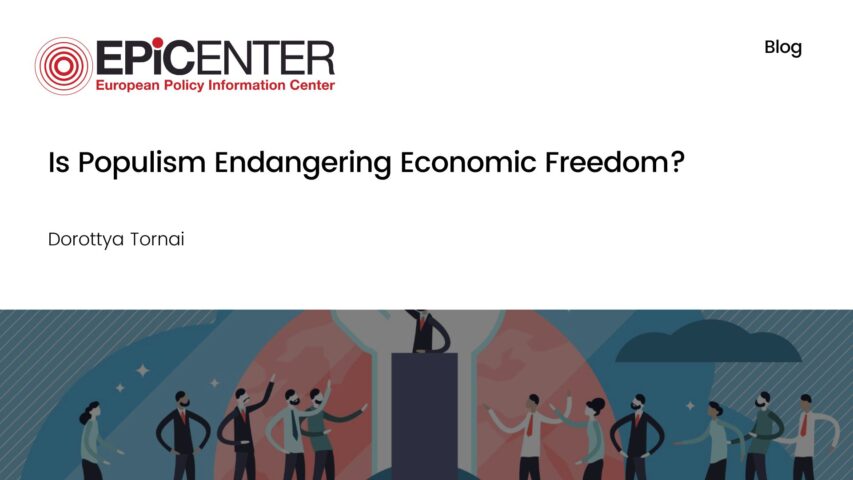Is Populism Endangering Economic Freedom?

Is Populism Endangering Economic Freedom?
Dorottya Tornai // 15 September 2020
Nationalism and populism have permeated the sphere of global politics in the 21st century, and the EU is no exception. This particular change in the political environment inevitably causes changes in economic policy, as populist leaders tend to increase governmental spending, focus on more protectionist policies, and raise trade barriers. Yet, the correlation between the establishment of an authoritarian regime and a decline in economic freedom is not that straightforward.
Nationalist, populist and anti-liberal governments have gained more ground in the last decade. The will to return to the safety net of a nation-state has significantly intensified in response to internal conflicts of the EU. Examples vary from Brexit to the success of right-wing parties in the Italian, Austrian and German elections in 2017. The 2019 edition of Timbro Authoritarian index detects this increased public interest and trust in extremist establishments. The research suggests that 26.8%, thus more than one in every four European citizens, cast their vote for a populist party. These authoritarian parties have also gained political power, such as in the case of Hungary (68.9% of all votes in the last election), Greece (57%) and Italy (56.7%).
However, is there a correlation between the rise of populism and deviation of economic freedom rating? The Economic Freedom of the World: 2020 Annual Report has just been released by the Fraser Institute, and the published data offers a conflicting response to this question. The index measures the extent to which policies and institutions of countries support economic freedom. Countries receive a rating from 0 to 10, 10 being the most economically free and 0 the least.
If we look at Hungary, the country with the most notable support for populism, the EFW responds to the political shift by showing a decline in economic freedom when the right-wing, illiberal party, FIDESZ won the elections in 2010. The country’s rating fell from 7.60 to 7.39 from 2010 to 2015. Yet it improved in the 2020 Annual Report, and received 7.44. However, if we look at the variables which contribute to the overall index, increased government consumption, subsidies and investment caused the most substantial drop after the change of government in 2010. An example is CSOK, a government subsidy introduced in 2015 to boost home building. A strong decline in judicial independence and impartial courts can also be observed in this period. Hungary’s EFW index could have improved despite the intensification of populism over the years due to robust economic growth resulting from EU funds and rising disposable income. Licencing procedures have been modernised, the entrepreneurial environment is supported by trade freedom (continuously increasing rating), and personal tax rates have been lowered. All of these compensate for the excessive government spending, corruption, and the threatened judicial independence.
Greece also experienced a rise in support for populist parties in the 2012 elections where the voting percentage jumped from 19% to 50.5% in favour of more authoritarian parties. Still, it is important to note, that Greece – unlike Hungary – faced left-wing populism. The political shift towards populism mirrored in the country’s EFW ranking as well, similarly to Hungary, in the form of decline. It fell from 7.12 to 6.63 from 2010 to 2015 due to the significant increase in governmental subsidies and investment, and a slump in sound money. For example, in 2011 the government launched a ‘New innovative entrepreneurship’ scheme which distributed grants to support prospective and existing entrepreneurs. Furthermore, just like Hungary, Greece also experienced a rebound after 2015, and its rating has slightly increased to 6.71 in the 2020 report. This rebound is the consequence of consigning extremism to the margin at the end of Syriza’s governing years. This is also reflected by election results in 2019 when Syriza was ousted by a centre-right party, called New Democracy.
In Italy, the appearance and success of populist parties is also noticeable. It held its general election in 2018 where the right-wing populist coalition, Lega received 37% of the votes and it was followed by a left-wing populist establishment, the Five Star Movement with 32.7% of the votes. During the governing years of a centre-left alliance, Italy shows a slight improvement in its rating (7.57 – 7.71 from 2010 to 2015). The change of government is followed by a decline in the level of economic freedom (7.51). This last rating is below the rating it received in 2000. There is a stronger involvement of the government (6.24 – 5.54), and one can also observe a slight fall in the freedom to trade internationally (8.66 – 8.59). These new policies involve higher government spending on research, education, welfare, introduction of minimum wage and pension guarantees for young people.
In summary, the establishment of a populist government results in a decline in the level of economic freedom. With regards to the permanence of that decline, there are still unresolved questions due to the instability of these populist parties. Greece offers an example of how authoritarian regimes fail to navigate through reality and that without consigning to more orthodox measures, they precipitate severe economic costs. This lets us assume that Hungary will experience a more severe decline in economic freedom in the following years if its governing style endures.
This blog is the second part of a series covering issues linked to the 2020 edition of the Fraser Economic Freedom of the World Index.
EPICENTER publications and contributions from our member think tanks are designed to promote the discussion of economic issues and the role of markets in solving economic and social problems. As with all EPICENTER publications, the views expressed here are those of the author and not EPICENTER or its member think tanks (which have no corporate view).



